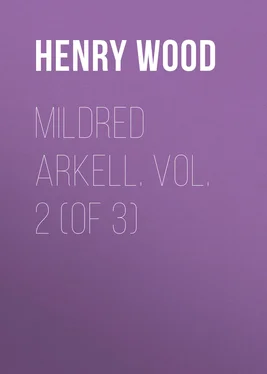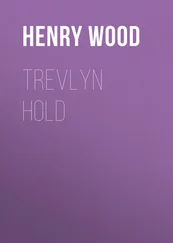Henry Wood - Mildred Arkell. Vol. 2 (of 3)
Здесь есть возможность читать онлайн «Henry Wood - Mildred Arkell. Vol. 2 (of 3)» — ознакомительный отрывок электронной книги совершенно бесплатно, а после прочтения отрывка купить полную версию. В некоторых случаях можно слушать аудио, скачать через торрент в формате fb2 и присутствует краткое содержание. Жанр: foreign_sf, literature_19, foreign_antique, foreign_prose, на английском языке. Описание произведения, (предисловие) а так же отзывы посетителей доступны на портале библиотеки ЛибКат.
- Название:Mildred Arkell. Vol. 2 (of 3)
- Автор:
- Жанр:
- Год:неизвестен
- ISBN:нет данных
- Рейтинг книги:4 / 5. Голосов: 1
-
Избранное:Добавить в избранное
- Отзывы:
-
Ваша оценка:
- 80
- 1
- 2
- 3
- 4
- 5
Mildred Arkell. Vol. 2 (of 3): краткое содержание, описание и аннотация
Предлагаем к чтению аннотацию, описание, краткое содержание или предисловие (зависит от того, что написал сам автор книги «Mildred Arkell. Vol. 2 (of 3)»). Если вы не нашли необходимую информацию о книге — напишите в комментариях, мы постараемся отыскать её.
Mildred Arkell. Vol. 2 (of 3) — читать онлайн ознакомительный отрывок
Ниже представлен текст книги, разбитый по страницам. Система сохранения места последней прочитанной страницы, позволяет с удобством читать онлайн бесплатно книгу «Mildred Arkell. Vol. 2 (of 3)», без необходимости каждый раз заново искать на чём Вы остановились. Поставьте закладку, и сможете в любой момент перейти на страницу, на которой закончили чтение.
Интервал:
Закладка:
"I know these foreign posts are uncertain," she observed, arousing herself, "and it will take, I suppose, eight or ten days before Mr. Hardcastle's remittance can reach him. Suppose it should not come when he expects, or that there should be another mistake in it?"
"Well?"
"Why—as we cannot afford to remain on here an indefinite period, waiting; at least, I suppose you would not like to do so, David; I was thinking it might be better for you to write home for more money yourself, and make certain."
"Just leave me to manage my own business, Betsey, will you: I am capable, I hope," was the common-councilman's ungracious answer. Nevertheless, he adopted his wife's suggestion.
Mr. and Mrs. Hardcastle continued all grace and smiles, pressing their champagne upon Mr. Dundyke and his wife at dinner, and hiring carriages, in which all the four drove out together. The common-councilman was rapidly overcoming his repugnance to a table-d'hôte, but the sumptuous one served in the hotel was very different from those he had been frightened with on his journey, and in the third week of his stay his wife had to let out all his waistcoats. The little excursions in the country he cared less for. The lovely country about Geneva was driven over again and again: Ferney, Coppet, the houses of Madame de Staël and Voltaire, all were visited, not much, it is to be feared, to the edification of the common-councilman. Thus three weeks from the time of their first arrival, passed rapidly away, and Mr. Dundyke and his wife felt they could not afford the time to linger longer in Geneva. They now only waited for the repayment of the twenty pounds from Mr. Hardcastle, and, strange to say, that gentleman's money did not arrive. He could not account for it, and gave vent to a few lordly explosions each morning that the post came in and brought him no advice of it.
"I'll tell you what it is!" he suddenly observed one morning—"I'll lay a thousand pounds to a shilling they have misunderstood my instructions, and have sent the money on to Genoa, whither we are bound after leaving here!"
"What a disaster!" uttered Mr. Dundyke. "Will the money be lost, sir?"
"No fear of that: nobody can touch it but myself. But look at the inconvenience it is causing, keeping me here! And you also!"
"I cannot remain longer," said Mr. Dundyke; "my time is up, and I may not exceed it. You can give me an order to receive the 20 l. in London, sir: it will be all the same."
"But, my good fellow, how will you provide for the expenses of your journey to London?"
"I have managed that, sir," said the common-councilman. "I wrote home for thirty pounds."
"And is it come?" asked Mr. Hardcastle, turning his eye full upon the common-councilman with the startling rapidity of a flash of lightning. Mrs. Dundyke noticed, with astonishment, the look and the eager gesture: neither ever faded from her recollection.
"They came this morning," said the common-councilman. "I have them both safe here," touching the breast-pocket of his coat. "They were in them letters you saw me receive."
On rising from breakfast, Mr. Dundyke strolled out of the hotel, and found himself on the borders of the lake. The day was fearfully hot, and he began to think a row might be pleasant. A boat and two men were at hand, waiting to be hired, and he proceeded to haggle about the price, for one of the boatmen spoke English.
"I have spent a deal of money since I have been here, one way or another," he soliloquized, "and the bill I expect will be awful. But it won't be much addition, this row—as good be hung for a sheep as a lamb—so here goes."
He stepped into the boat, anticipating an hour's enjoyment. A short while after this, Mrs. Hardcastle, accompanied by Mrs. Dundyke, came on to Rousseau's Island. Mr. Dundyke was not so far off then, but that his wife recognised him. Mr. Hardcastle was the next to come up.
"What are you looking at? Why, who's that in a boat there? Surely not Dundyke! Give me the glass."
"Yes, it is," said Mrs. Dundyke.
"Where in the name of wonder is he off to, this melting day? To drown himself?"
The ladies laughed.
"Ah! I see; he can't stand it. The men are bearing off to the side—going to land him there. They had better put back."
Mrs. Dundyke sat down underneath the poplar trees, spreading a large umbrella over her head, and took out her work. Mrs. Hardcastle was never seen to do any work, but she seated herself under the shade of the umbrella; and the gentleman, leaving them to themselves, walked back again over the suspension bridge.
CHAPTER IV.
A MYSTERY
Which of the three wore the deepest tint, the darkest blue—the skies, the hills, or the lake? Each was of a different shade, but all were blue and beautiful; and on all lay the aspect of complete repose. The two ladies, in that little garden near the Hôtel des Bergues, Rousseau's Island, as it is called, and which you who have sojourned in Geneva remember well, looking out over the lake at the solitary boat bearing away towards the right, noticed that no other object broke the prospect's stillness. It was scarcely a day for a row on Geneva's lake. Not a breath of air arose to counteract the vivid heat of the August sun; hot and shadeless he poured forth his overpowering blaze; and, lovely as the lake is, favoured by nature and renowned in poetry, it was more lovely that day to look at than to glide upon.
So thought the gentleman in that solitary boat, our friend Mr. David Dundyke—or, let us give him the title he had of late aspired to, David Dundyke, Esquire. He felt, to use his own words, "piping hot;" he sat on one side of the boat, and the sun burnt his back; he changed to the other, and it blistered his face; he tried the stern, and the sun seemed to be all round him. He looked up at the Jura, with a vain longing that they might be transported from their site to where they could screen him from his hot tormentor: he turned and gazed at the Alps, and wished he could see on them a shady place, and that he was in it; but, wherever he looked and turned, the sun seemed to blind and to scorch him. Some people, clayey mortals though the best of us are, might have found poetry, or food for it, in all that lay around; but David Dundyke had no poetry in his heart, still less in his head. He glanced, with listless, half-shut eyes, at the two men who were rowing him along; and began to wonder how any men could be induced to row, that burning day, even to obtain a portion of the world's idol—money. David Dundyke cared not, not he, for the scenery around; he never cared for anything in his life that was not substantial and tangible. What was the common scenery of nature to him, since it could not add to his wealth or enhance his importance?—and that was all the matter at his heart. He had never looked at it all the way from London to Geneva; he did not look at that around him now. Geneva itself, its lovely surrounding villas, its picturesque lake, the glorious chain of mountains on either side, even Mont Blanc in the distance, were as nothing to him. For some days after his arrival at Geneva, the mountain had remained obstinately enshrouded in clouds; but one evening that he and his wife were walking outside the town with Mr. Hardcastle, it was pointed out to him, standing proudly forth in all its beauty; and he had stared at it with just as much interest as he would have done at the hill in Greenwich Park covered with snow. He had seen the lovely colour, the dark, brilliant blue of the Rhone's waters, as they escaped from the lake to mingle with those of the thick, turbulent Arve; and he did not care to notice the contrast in the streams. There were no associations in his mind connected with that fair azure lake, whence coursed the one; he had no curiosity as to the never-changing glaciers that were the source of the other.
Читать дальшеИнтервал:
Закладка:
Похожие книги на «Mildred Arkell. Vol. 2 (of 3)»
Представляем Вашему вниманию похожие книги на «Mildred Arkell. Vol. 2 (of 3)» списком для выбора. Мы отобрали схожую по названию и смыслу литературу в надежде предоставить читателям больше вариантов отыскать новые, интересные, ещё непрочитанные произведения.
Обсуждение, отзывы о книге «Mildred Arkell. Vol. 2 (of 3)» и просто собственные мнения читателей. Оставьте ваши комментарии, напишите, что Вы думаете о произведении, его смысле или главных героях. Укажите что конкретно понравилось, а что нет, и почему Вы так считаете.












